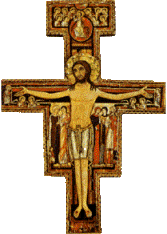An excerpt from Pope Benedict's Jesus of Nazareth (pg. 79)
Here Pope Benedict is writing about The Beatitudes, specifically the first...Blessed are the poor/Blessed are the poor in spirit....and after commenting on Francis' most radical response he takes up the role of the lay/secular followers of Francis. He writes;
"......For [Francis] did not want to found a religious order: He simply wanted to gather the People of God to listen anew to the word---without evading the seriousness of God's call by means of learned commentaries.
"By creating the Third Order, though, Francis did accept the distinction between radical commitment and the necessity of living in the world. The point of the Third Order is to accept with humility the task of one's secular profession and its requirements, wherever one happens to be, while directing one's whole life to that deep interior communion with Christ that Francis showed us." (emphasis added)
This is for most a lengthy transformation. Initially, these appear as competing interests; the profane (we might even call it mundane worldly endeavors) vs. the sacred aspirations of union with God's will. But each realm makes legitimate claims on our life; and in time we grow in the awareness that it's not competition but integration...a truely sacred secularity. A secular life made holy.
In the early stage of our formation this division of our time between the sacred and profane realms is often seen as struggle. It can cause tensions and frustrations and deprive us of the sought after 'fruit' of our efforts; something as pure and simple as joy.
We need to keep in mind that this 'acceptance with humility of our secular profession with its requirements and tasks while directing the whole of one's life to Christ' does not mean that we merely 'put up' with the mundane circumstances. That would be like 'putting up' with unpleasant conditions for 50 weeks to enjoy 2 weeks vacation.
At some point we begin to understand that the secular world is not something to be avoided or marginalized but brought into the realm of the sacred and lifted up, so to speak. Then we begin to witness our own transformation. For in this 'lifting up of the secular/profane' (and that is exactly what a Secular is called to do) we are responding to our vocation, God's express call to us and his will for us.
To state this another way, The Secular Franciscan in the process of "...directing one's whole life to that deep interior communion with Christ that Francis showed us...." cannot leave the world behind; otherwise he misses or misinterprets his original call to vocation.
For me it is a slow gradual process of meshing my secular life with the will of God; which He reveals to me daily in all my activities if I take the time to listen.





No comments:
Post a Comment